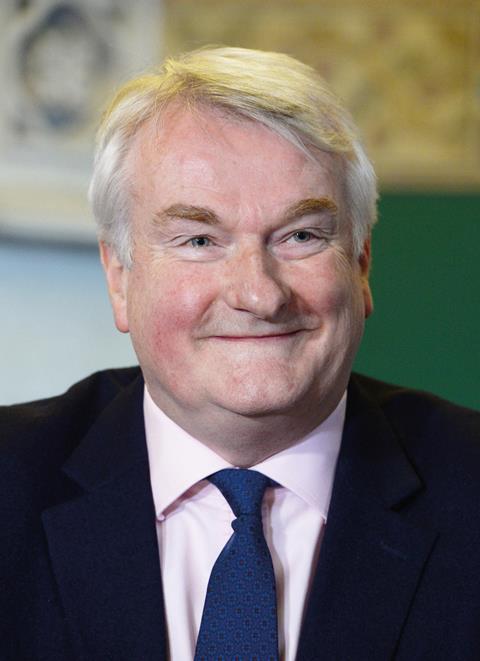In exactly a month, England and Wales will have its first lady chief justice. What changes can we expect when Dame Sue Carr succeeds Lord Burnett of Maldon?

‘No man is a hero to his valet,’ the saying goes, but Burnett is certainly a hero to his private secretary. ‘It has been the greatest honour to support such a wonderful and kind man who has made the most incredible difference,’ Ben Yallop wrote last November after Burnett had announced his retirement date.
‘The lord chief justice holds vital – but independent – relationships with the executive, parliament and with judges and lawyers from across the world,’ Yallop added. ‘Make no mistake, this lord chief justice has done more than you could ever know on your behalf at the pinnacle of public service.’
More than we shall ever know, I suspect. Burnett (pictured) has been punctilious in not criticising the six members of the executive with whom he had the closest relationship. Sir Geoffrey Vos, the master of the rolls, said at Burnett’s valedictory ceremony that it was to his very great credit that he had got on well with each of the lord chancellors who served during his six years in office, working closely with them all for the benefit of the justice system.

But the difficulties Burnett had with Dominic Raab are widely known. At Raab’s first swearing-in, the judges were kept waiting for 25 minutes – perhaps because the lord chancellor was unable to find the right shirt to wear with his ceremonial dress. When Raab was reappointed, Burnett scrapped the ceremony and told him to turn up in a lounge suit.
Vos chose six judgments to demonstrate the impact Burnett had in developing the law. I’ll mention just three of them.
Towards the end of 2020, Burnett’s court comprehensively rejected a challenge to the Covid lockdown regulations brought by Simon Dolan, an expatriate businessman. The judgment in R (Dolan) v Health Secretary not only warned off other potential challengers. It also imposed a much greater procedural rigour on judicial review generally.
On the criminal side, Burnett had to deal with well-meaning environmental protesters convicted of public nuisance. In Roberts, Blevins and Loizou (2018), he said that defendants imprisoned for blocking a road in protest against fracking should have received community orders. In Brown (2022), he decided that a man who had glued himself to the roof of an aircraft should have his sentence reduced from 12 months to four.
But the master of the rolls chose not to mention Miller 2, the prorogation case in which the Court of Appeal was overturned by the Supreme Court without any reference to Burnett’s reasoning. Nor did Vos mention another case where Burnett had found for the government – the ruling in June on removals to Rwanda, when the lord chief justice was overruled by the appeal judges who sat with him.
One of Burnett’s most important achievements was persuading ministers to reverse the damage done by a new pension scheme they had imposed on the judiciary in 2015. Reforms enacted last year are credited with improving recruitment to the High Court.
But Burnett’s greatest success was keeping the show on the road when Covid hit. He supported the use of remote hearings and socially distanced jury trials while other jurisdictions took months to adjust.
His achievements are all the greater because Liz Truss, as lord chancellor, refused to let a more senior judge fill in as chief justice for a couple of years, which would have allowed Burnett to gain experience in a leadership post. His only external role during a brief stint in the Court of Appeal was to serve as vice-chair of the Judicial Appointments Commission.
By a spooky coincidence, his successor also held that job. But while Burnett was appointed chief justice because nobody senior to him was suitable, Carr was appointed in preference to Dame Victoria Sharp, who as president of the King’s Bench division was the obvious favourite. What swung it for Carr, I suspect, was her self-confidence and force of personality.
When I interviewed Carr last year for Law in Action, she robustly defended the Judicial Appointments Commission against concerns that the senior judiciary did not reflect the society it served.
I. Stephanie Boyce, the Law Society’s first Black president, had said solicitors and lawyers from diverse backgrounds had encountered a glass ceiling.
‘Solicitors have many skills directly relevant to the role of a senior judge that barristers won’t have,’ Carr said. ‘But if the relevant standard is not met, there is simply nothing we can do about it.’
In contrast to Burnett, Carr upheld lengthy prison sentences on two climate-change protesters who climbed a bridge and closed a section of the M25 motorway for more than 40 hours.
Firm but fair? Not quite: I would describe Carr as fair but firm.
joshua@rozenberg.net































4 Readers' comments